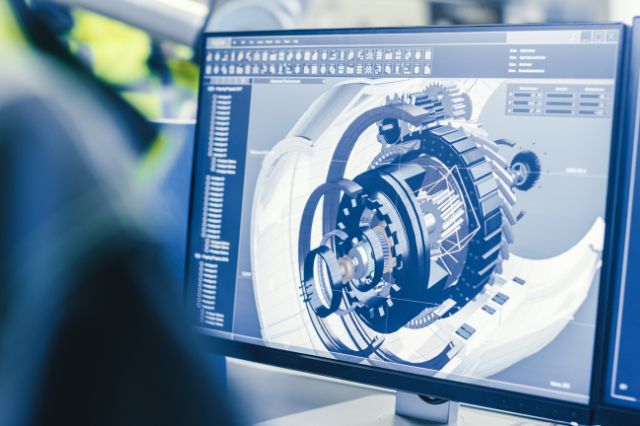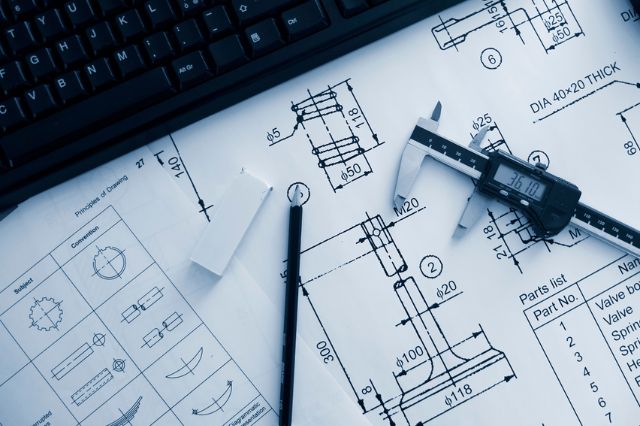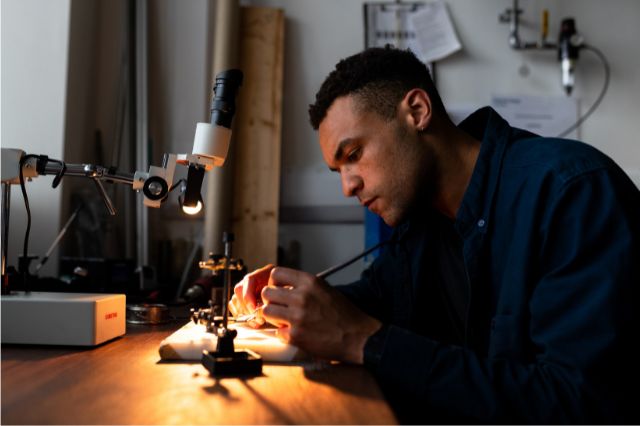Mechanical design engineers are behind many of the products, machines and systems we rely on every day. From car engines to wind turbines, they take ideas and turn them into working parts that can be manufactured, tested and used safely.
This article explores what the role of a Mechanical design Engineer really involves. We’ll look at the difference between mechanical designers and engineers, day-to-day tasks, skills you’ll need, and the steps to get started in the field.
What Does a Mechanical Design Engineer Do?
Mechanical design engineers take product ideas and turn them into detailed, working designs. They begin with a brief that outlines what the product needs to do, how much it should cost, and when it needs to be ready. From there, they sketch out early ideas and choose materials that balance function and cost.
Using CAD software, they create 3D models and assemblies to check how parts fit and move together. They then produce technical drawings with accurate measurements and details for manufacturing teams or suppliers to use.
The role involves regular communication with other teams, including electrical engineers, quality staff and suppliers. As designs evolve, engineers update drawings and keep track of changes using document control systems. Many roles also include building and testing prototypes. Once production starts, engineers support the build process, help solve any technical issues and suggest design tweaks.
Is Mechanical Design Engineering a Good Career?
This career offers stable employment because manufacturers and companies across the UK constantly need new product designs. Making the demand for mechanical design engineers always high. Salaries often begin around £28,000 to £32,000 for those newly qualified, rising to £40,000‑£55,000 for mid‑level roles. Senior specialists may earn £60,000+.
Earning potential links directly to skill set, location, company size, and responsibilities.
Entry‑level positions often appear in regions with strong industrial bases like the Midlands, the North West, and Scotland. That means relocating may open more options. Training support and apprenticeships help new graduates move into design engineering roles and grow into senior posts.
Take a look at the Engineering vacancies we are currently recruiting for here!
Mechanical Designer vs Mechanical Engineer
Mechanical designer roles often focus on the details of component creation and drawing work. CAD modelling, preparing fabrication drawings, and working to tight tolerances tend to fall into the designer remit. Engineers may work more on system-level analysis, calculations, testing, and product validation. That said, many employers in the UK bundle both sets of responsibilities under titles like mechanical design engineer.
Despite differences, skill sets overlap. Strong CAD proficiency, understanding of mechanics and materials, communication abilities, and attention to detail serve both roles well. UK firms increasingly seek professionals who can both design and analyse products, tackling challenges from concept through manufacture.
How Employers Merge The Two Roles
Many job adverts use mechanical design engineer to mean both design and engineering tasks. Employers look for individuals who are able to take concepts from initial sketch to finished product. Firms of various sizes across the UK expect versatile candidates who can both create CAD models and perform analytical work, especially in smaller teams.
How to Become a Mechanical Design Engineer
In the UK, people enter the field through university degrees, apprenticeships or Hight National Diploma (HND) studies. A bachelor’s in mechanical engineering or product design gives a route into graduate programmes. Apprenticeships, both higher and degree‑level, combine paid work with study. HND or foundation diploma holders often start as mechanical designers and work toward engineering roles.
Mechanical Design Engineer Skills
Mechanical design engineers must be confident with CAD tools. Proficiency in modeling, assemblies, and drawing documentation forms the day‑to‑day toolkit. Most UK companies expect solid experience with software such as SolidWorks or Siemens NX. Familiarity with simulation tools such as Ansys, Abaqus or Altair helps with analysis tasks. Engineers who can run basic FEA or thermal checks have an edge.
Engineers also need a solid grasp of manufacturing. Understanding methods such as injection moulding, CNC machining, sheet metal forming or casting helps designs move smoothly to production.
Soft Skills That Are Useful For Mechanical Design Engineers
Problem‑solving involves more than fixing failures. It includes anticipating issues during design, manufacture or testing. Analytical thinking and logical decision‑making help reduce risk.
Communication includes reporting, presenting and liaising. Engineers must summarise technical info in a way others understand. They often present design reviews and maintain clear records for traceability.
Time‑management helps balance multiple tasks and deadlines. Design engineers may support multiple projects so staying organised and prioritising tasks prevents bottlenecks.
Read more about which soft skills employers look for in candidates.

Industries That Employ Mechanical Design Engineers
Mechanical design engineers are needed across a wide range of UK industries. In the automotive sector, there’s strong demand for engineers working on electric vehicles, especially in areas like batteries and cooling systems. Many roles are based in the Midlands and Oxfordshire, often focused on early-stage design and testing.
Aerospace companies in cities like Bristol and Belfast hire engineers to work on aircraft parts, drones, and satellite systems. These roles require a strong focus on meeting safety standards.
In energy and renewables, engineers design parts for wind turbines, heat exchangers and storage systems. Offshore wind in particular is growing fast, and many roles involve both desk-based design and site visits.
Consumer goods companies need engineers to develop products like appliances and tools. These jobs involve balancing looks, cost and function, and moving quickly from design to prototype.
Other key industries include medical devices and rail. At Electronics Group Recruitment, we work across all these sectors. Our goal is to connect skilled engineers with roles that match their experience and career plans.
How We Can Help at Electronics Group Recruitment
Our team specialises in placing mechanical design engineers across UK Industries. Working with us means you will have access to our deep knowledge of employers, trends, hiring cycles and key technical requirements.
We help refine CVs to highlight relevant skills. We ensure your achievements stand out to hiring managers. Interview preparation includes insight into employer priorities, and advice on technical tasks or tests.
We negotiate on your behalf to secure competitive salary, benefits and flexible working terms. We stay with you through offer stage into onboarding. Our support doesn’t end once you start. We check in to ensure you’re settled. You can expect all of this and more when you choose to find your next role with us.
We pride ourselves on long‑term relationships. Many candidates return to us when ready for senior roles or special projects. Our network across UK industry gives you access to roles you may not find elsewhere.
If you’re ready to make a move, our team at Electronics Group Recruitment is here to support you. Reach out to us to discover your next dream role as a mechanical design engineer.



